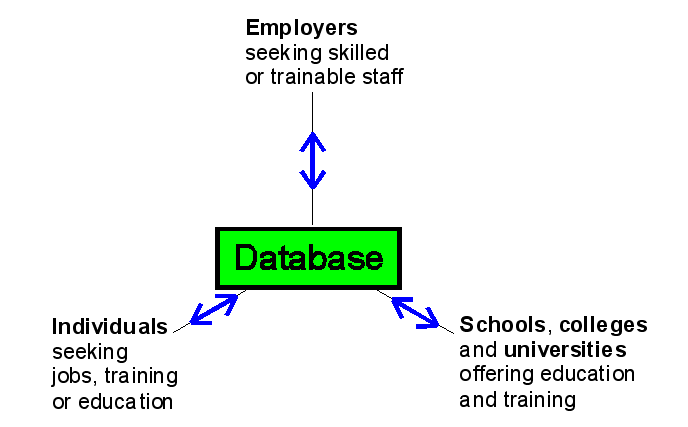Europe could take the lead by addressing the problem of Muslim alienation in job markets at home. The proposal could then be taken up elsewhere, for example in Iraq.
Other 'in groups' such as the extreme right wingers in Europe and the USA could also be drawn back into the fold if their concerns about job security were addressed.

Data mining will allow job market information to be used more efficiently.
Benefits for employers
¨ Identifying locally available skilled individuals would speed up the recruitment process.
¨ If the skilled people are not there, the deficiencies can be highlighted to inform the
local training providers and individuals seeking new skills.
Benefits for job-seekers
¨ Career planning would be more effective
¨ Motivation to improve skills would increase
¨ The system would treat all citizens equally
Benefits for education & training providers
¨ Trends in employer needs would be identified, increasing the
cost effectiveness of education and training.
¨ University degrees could become more relevant to job seekers and offer even better value for money. For example, based on employer needs highlighted by the database, an Archeology degree might include explicit objectives relating to team management, document archiving, landscape design and surveying.
Whole nation benefits
¨ Training needs would be identified at a local level, increasing the cost efficiency of
training investment.
¨ Reducing time lags matching up employers and new staff would lower the
"natural level of unemployment."
¨ Accurate information about workforce skills and business needs would speed up
economic recovery when important local industries fail.
¨ Social unrest and crime related to long-term unemployment would be less likely.
Features of a big data system
- The key skills mastered by job-seekers through work, education, training and life experiences would be identified.
- These skills would be stored on a National Skills Database.
- Employers or employment agencies acting on their behalf would interrogate the database to identify a group of anonymised potential job applicants. These would be individuals living within a specified area and having the skills required.
- The local database centre would then contact all registered job-seekers who fulfilled the criteria and invite them to apply for the posts on offer. The connection could be made electronically and/or traditional mail.
- This service would be free for unemployed people. Those currently in work would pay a small fee if they wished to be informed by post of relevant job vacancies.
- Surfers would have access to the job offers on the database via their own devices, schools, libraries, Careers Offices and Job Centres.
- The skill requests from employers would be used to modify existing training and education courses.
- With the exception of the vacancy filling process, participating businesses would also be anonymised, to protect business confidentiality.
Funding
Employers would pay a fee for recruiting via the database. This would be a cost effective investment because it would replace traditional advertising costs and would reduce the paperwork traditionally associated with the employee selection process.
The above proposal originated as Bill Courtney’s contribution to "Working Together in the Inner-City, A Handbook for TECs, Central Government Agencies, ………" Department of Employment May 1991.
Acknowledgement
The original 1991 work was supported and improved by Bill’s line manager at the time, Graham Peake.
